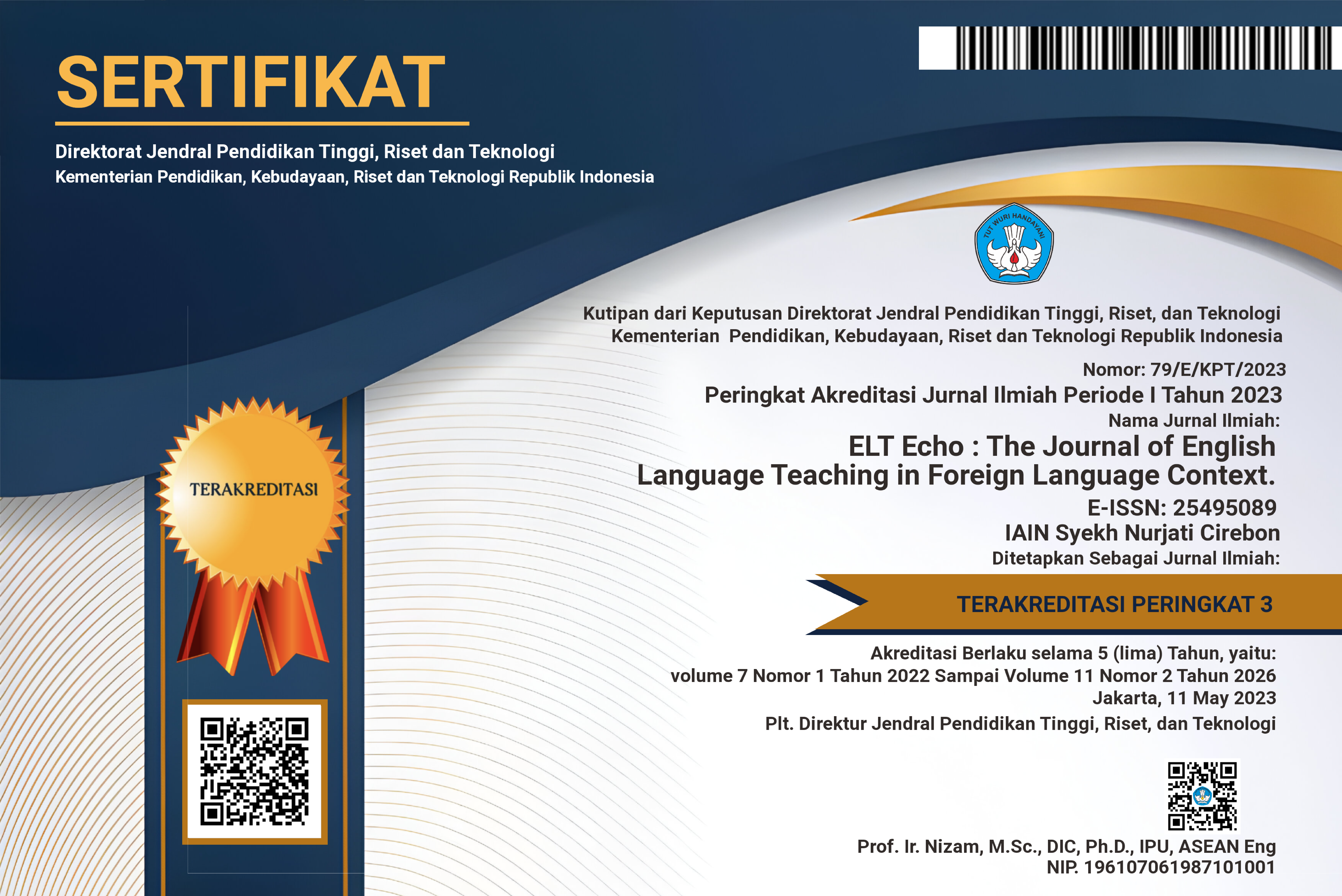CONSTRUCTING IDENTITY AND CONTINUING PROFESSIONAL DEVELOPMENT: A SUCCESSFUL EFL IN-SERVICE TEACHER’S STORY
(1) SMP YAPIS Al-Ijtihaad Madi Papua
(2) Islamic University of Indonesia
(*) Corresponding Author
Abstract
Keywords
Full Text:
PDFReferences
Alibakhshi, G., & Dehvari, N. (2015). EFL
teachers' perceptions of continuing professional development: a case of Iranian high school teachers. Profile issues in teachers professional development, 17(2), 29-42. https://doi.org/10.15446/profile.v17n2.44374
Alshumaimeri, Y. A., & Almohaisen, F. A.
(2017). Saudi EFL teachers’ perceptions of professional development activities. Journal of Education & Social Policy, 7(1), 185-193.
Avalos, B. (2011). Teacher professional
development in teaching and teacher education over ten years. Teaching and Teacher Education, 27(1), 10-20. https://doi.org/10.1016/j.tate.2010.08.007
Barkhuizen, G. (2016). Narrative approaches to exploring language, identity and power in
language teacher education. RELC Journal, 47(1), 25-42. https://doi.org/10.1177/0033688216631222
Barkhuizen, G., Benson, P., & Chik, A. (2014). Narrative inquiry in language teaching and learning research. New York, NY: Routledge.
Benn, R., Akiva, T., Arel, S., & Roeser, R. W. (2012). Mindfulness training effects for
parents and educators of children with special needs. Developmental psychology, 48(5), 1476. https://doi.org/10.1037/a0027537
Brown, H. D. (2000). Principles of language
learning and teaching (Vol. 4). New York: Longman.
Carpenter, J. P., & Linton, J. N. (2016). Edcamp unconferences: Educators' perspectives on an
untraditional professional learning experience. Teaching and Teacher Education, 57, 97-108. https://doi.org/10.1016/j.tate.2016.03.004
Geldenhuys, J. L., & Oosthuizen, L. C. (2015). Challenges influencing teachers' involvement
in continuous professional development: A South African perspective. Teaching and Teacher Education, 51, 203-212. https://doi.org/10.1016/J.TATE.2015.06.010
Ghanizadeh, A., & Jahedizadeh, S. (2016). EFL teachers’ teaching style, creativity, and
burnout: A path analysis approach. Cogent Education, 3(1), 1151997. https://doi.org/10.1080/2331186X.2016.1151997
Government Regulation of Republic Indonesia No. 19/2017 about The Change of
Government Regulation No.74/2008 via http://ditjenpp.kemenkumham.go.id/arsip/ln/2017/pp19-2017bt.pdf
Grosemans, I., Boon, A., Verclairen, C., Dochy, F., & Kyndt, E. (2015). Informal learning of
primary school teachers: Considering the role of teaching experience and school culture. Teaching and Teacher Education, 47, 151-161. https://doi.org/10.1016/j.tate.2014.12.011
Guskey, T. R., & Sparks, D. (2000). Evaluating professional development. Corwin Press.
Huang, Z. (2010). What Makes a Successful EFL Teacher in China? A Case Study of an
English Language Teacher at Nanjing University of Chinese Medicine. English language teaching, 3(3), 20-28. https://doi.org/10.5539/elt.v3n3p20
Hung, H.-T., & Yeh, H.-C. (2013). Forming a change environment to encourage professional
development through a teacher study group. Teaching and Teacher Education, 36, 153–165. https://doi.org/10.1016/j.tate.2013.07.009
Kang, Y., & Cheng, X. (2014). Teacher learning in the workplace: A study of the relationship
between a novice EFL teacher’s classroom practices and cognition development. Language Teaching Research, 18(2), 169-186. https://doi.org/10.1177/1362168813505939
Kennedy, M. M. (2016). How does professional development improve teaching?. Review of
educational research, 86(4), 945-980. https://doi.org/10.3102/0034654315626800
Kyndt, E., Gijbels, D., Grosemans, I., & Donche, V. (2016). Teachers’ everyday professional
development: Mapping informal learning activities, antecedents, and learning outcomes. Review of educational research, 86(4), 1111-1150. https://doi.org/10.3102/0034654315627864
Limon, M. R. (2016). The effect of the adequacy of school facilities on students’ performance
and achievement in technology and livelihood education. International Journal of Academic Research in Progressive Education and Development, 5(1), 45-58. https://doi.org/10.6007/IJARPED/v5-i1/2060
Olsen, B., & Buchanan, R. (2017). “Everyone wants you to do everythingâ€: Investigating the
professional identity development of teacher educators. Teacher education quarterly, 44(1), 9-34.
Patahuddin, S.M., & Logan, T. (2018).
Facebook as a mechanism for informal teacher professional learning in Indonesia. Teacher Development. https://doi.org/10.1080/13664530.2018.1524787
Rahman, B., Abdurrahman, A., Kadaryanto, B., & Rusminto, N. E. (2015). Teacher-Based
Scaffolding as a Teacher Professional Development Program in Indonesia. Australian Journal of Teacher Education, 40(11), n11. https://doi.org/10.14221/ajte.2015v40n11.4
Raud, N., & Orehhova, O. (2017). In-service training of teachers of english as a foreign
language in estonia: mapping of trends and opportunities. Problems of Education in the 21st Century, 75(2). https://doi.org/10.33225/pec/17.75.194
Sari, E. R. (2012). Online learning community: a case study of teacher professional
development in Indonesia. Intercultural Education, 23:1, 63-72. http://dx.doi.org/10.1080/14675986.2012.664755
Smith, J. A., & Osborn, M. (2008). Interpretative phenomenological analysis. In Qualitative
Psychology: A practical guide to research methods. SAGE Publications Ltd. https://doi.org/10.4135/9781848607927.n11
Soebari, T., & Aldridge, J. M. (2016). Investigating the differential effectiveness of a teacher
professional development program for rural and urban classrooms in Indonesia. Teacher Development, 20(5), 701-722. https://doi.org/10.1080/13664530.2016.1185031
Teng, M. F. (2017). Emotional Development and Construction of Teacher Identity: Narrative
Interactions about the Pre-Service Teachers' Practicum Experiences. Australian Journal of Teacher Education, 42(11), 117-134. https://doi.org/10.14221/ajte.2017v42n11.8
Widodo, A., & Riandi. (2013). Dual-mode teacher professional development: Challenges and
re-visioning future TPD in Indonesia. Teacher Development:An International Journal of Teachers’ Professional Development, 17:3, 380-392. https://doi.org/10.1080/13664530.2013.813757
Zein, M. S. (2017). Professional development needs of primary EFL teachers: Perspectives of
teachers and teacher educators. Professional Development in Education, 43(2), 293-313. https://doi.org/10.1080/19415257.2016.1156013
DOI: 10.24235/eltecho.v7i1.9539
Article Metrics
Abstract view : 101 timesPDF - 16 times
Refbacks
- There are currently no refbacks.
Â
This Journal is indexed by:
Â

This work is licensed under a Creative Commons Attribution 4.0 International License.










